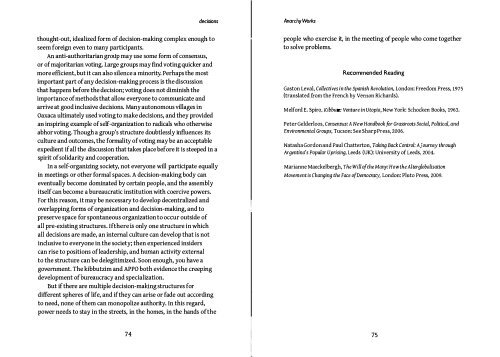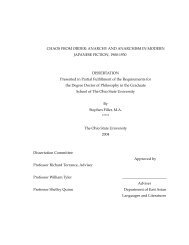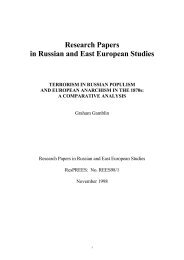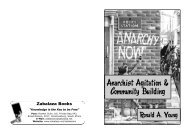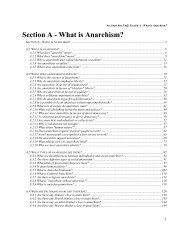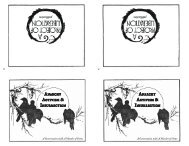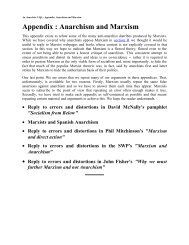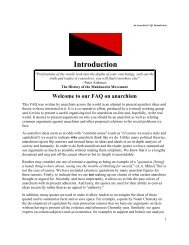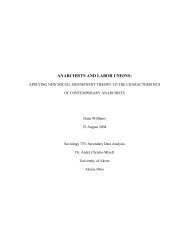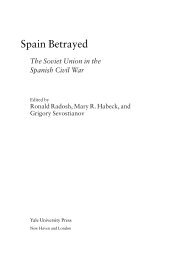Anarchy Works.pdf - Infoshop.org
Anarchy Works.pdf - Infoshop.org
Anarchy Works.pdf - Infoshop.org
You also want an ePaper? Increase the reach of your titles
YUMPU automatically turns print PDFs into web optimized ePapers that Google loves.
decisions<br />
<strong>Anarchy</strong> <strong>Works</strong><br />
thought-out, idealized form of decision-making complex enough to<br />
seem foreign even to many participants.<br />
An anti-authoritarian group may use some form of consensus,<br />
or of majoritarian voting. Large groups may find voting quicker and<br />
more efficient, but it can also silence a minority. Perhaps the most<br />
important part of any decision-making process is the discussion<br />
that happens before the decision; voting does not diminish the<br />
importance of methods that allow everyone to communicate and<br />
arrive at good inclusive decisions. Many autonomous vUlages in<br />
Oaxaca ultimately used voting to make decisions, and they provided<br />
an inspiring example of self--<strong>org</strong>anization to radicals who otherwise<br />
abhor voting. Though a group's structure doubtlessly influences its<br />
culture and outcomes, the formality of voting may be an acceptable<br />
expedient if all the discussion that takes place before it is steeped in a<br />
spirit of solidarity and cooperation.<br />
In a self-<strong>org</strong>anizing society, not everyone will participate equally<br />
in meetings or other formal spaces. A decision-making body can<br />
eventually become dominated by certain people, and the assembly<br />
itself can become a bureaucratic institution with coercive powers.<br />
For this reason, it may be necessary to develop decentralized and<br />
overlapping forms of <strong>org</strong>anization and deciSion-making, and to<br />
preserve space for spontaneous <strong>org</strong>anization to occur outside of<br />
all pre-existing structures. If there is only one structure in which<br />
all decisions are made, an internal culture can develop that is not<br />
inclusive to everyone in the society; then experienced insiders<br />
can rise to positions of leadership, and human activity external<br />
to the structure can be delegitimized. Soon enough, you have a<br />
government. The kibbutzim and APPO both evidence the creeping<br />
development of bureaucracy and specialization.<br />
But if there are multiple decision-making structures for<br />
different spheres of life, and if they can arise or fade out according<br />
to need, none of them can monopolize authority. In this regard,<br />
power needs to stay in the streets, in the homes, in the hands of the<br />
people who exercise it, in the meeting of people who come together<br />
to solve problems.<br />
Recommended Reading<br />
Gaston Leva!, Collectives in the Spanish Revolution, London: Freedom Press, 1975<br />
(translated from the French by Vernon Richards).<br />
Melford E. Spiro, Kibbutz: Venture in Utopia, New York: Schocken Books, 1963.<br />
Peter Gelderloos, Consensus: A New Handbook for Grassroots Sodal, Political, and<br />
Environmental Groups, Tucson: See Sharp Press, 2006.<br />
Natasha Gordon and Paul Chatterton, Taking Back Control: A}ourney through<br />
Argentina's Popular Uprising, Leeds (UK): University of Leeds, 2004.<br />
Marianne Maeckelbergh, The will of the Many: How the Alterglobalisation<br />
Movement is Changing the Face of Democracy, London: Pluto Press, 2009.<br />
74<br />
75


